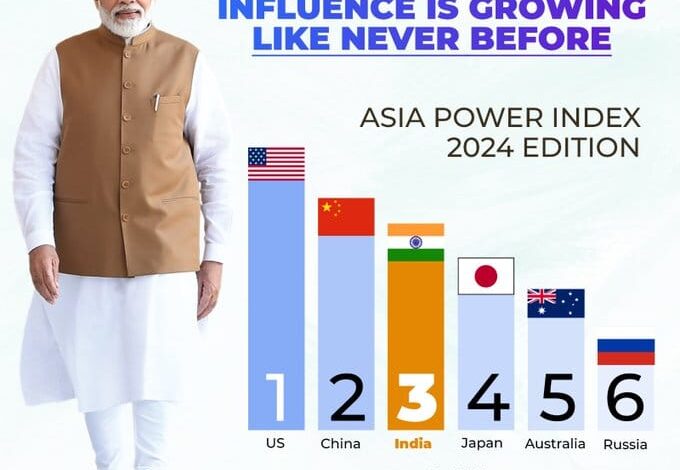India Declared the Third Most Powerful Nation: What Does This Mean for Global Geopolitics?

In a major geopolitical shift, India surpasses Russia and Japan to become the third most powerful nation.
India’s emergence as the third most powerful country globally, as declared by the Lowy Institute’s Asia Power Index, has sparked significant discussions in international circles. Several government officials, including Hardeep Singh Puri, have praised Prime Minister Modi for this achievement, marking a historic moment for India on the global stage. But what does this mean for the geopolitical landscape, and how will India maintain this standing?
India Surpasses Russia and Japan: The Significance of Lowy Institute Rankings
The Lowy Institute, an Australia-based mega think tank, is known for its highly credible and well-respected reports on global power dynamics. Their Asia Power Index focuses on the Indo-Pacific region, which has become the central axis of global power. The region stretches from Israel to the United States, and the nation that dominates this region will hold substantial sway in terms of trade, resources, and influence.
PM Modi’s Visit to the US: How India is Countering the Khalistan Agenda
Previously, Russia and Japan were placed ahead of India, but the latest rankings have changed this. India now stands as the third most powerful nation, right behind the United States and China, who continue to occupy the top spots.
The Parameters Behind India’s Rise
The Lowy Institute ranks countries based on eight key parameters:
- Economic Capability
- Military Capability
- Resilience
- Future Resources
- Economic Relationships
- Defense Networks
- Diplomatic Influence
- Cultural Influence
India’s ranking has been boosted significantly by its performance in these areas, especially in terms of economic relationships and future resources. For example, recent developments like Quad agreements and India’s expanding role in global technology sectors have added to its influence.
Why Did Russia and Japan Fall Behind?
Russia’s decline is attributed to a multitude of factors, including its economic isolation due to sanctions and a weakened diplomatic position, especially after the Ukraine war. Russia’s diminishing influence in global diplomacy and resource security has resulted in its drop in the rankings.
Japan, once considered a dominant power in Asia, lacks significant military capabilities compared to India. Despite its economic strength, Japan has lagged behind in areas such as military influence and future readiness, giving India the edge.
India’s Diplomatic and Economic Wins
India’s strategic partnerships, especially within the Indo-Pacific region, have played a critical role in its rise. Diplomatic agreements like Quad (Australia, Japan, US, and India), and India’s involvement in nuclear submarine technology under AUKUS, have significantly enhanced its global standing. Furthermore, India’s partnerships in sectors like semiconductor manufacturing and space exploration add to its long-term strategic resources.
Challenges and Areas of Improvement
While India has seen remarkable growth, the report highlights areas that still need improvement. One such area is the defense networks, where India lags behind countries like the USA and China. To solidify its position, India needs to enhance military alliances and expand its defense infrastructure.
Another critical point of concern is the military-to-military engagements. While India’s naval strength is growing, it still requires more military bases abroad to ensure greater operational flexibility in times of conflict.
What the Future Holds for India’s Power Status
According to the Lowy Institute, India has great potential but achieving superpower status will still take decades. Despite its progress, India’s overall score of 39 remains far behind China’s 70+, which is the threshold for superpower classification. However, the trend shows that as India continues to strengthen its diplomatic ties, improve its resilience, and secure more future resources, it could very well close this gap in the coming decades.
India’s rise as a potential superpower is evident, especially as more reports and rankings start acknowledging its growing influence in the global order. In fact, several experts predict that India’s role in the global power vacuum left by Russia’s decline will continue to expand, with more nations aligning themselves with India for trade and security cooperation.
Conclusion: Is India Ready for the Third Spot?
India’s rise to the third spot in the global power rankings is a significant milestone, but the journey ahead is still long. India must continue to invest in defense networks, form strategic military alliances, and leverage its diplomatic influence to further secure its position on the global stage.
Do you believe India is now the world’s third most powerful country? Or do you think Russia could still make a comeback? Share your thoughts in the comment section below.






One Comment